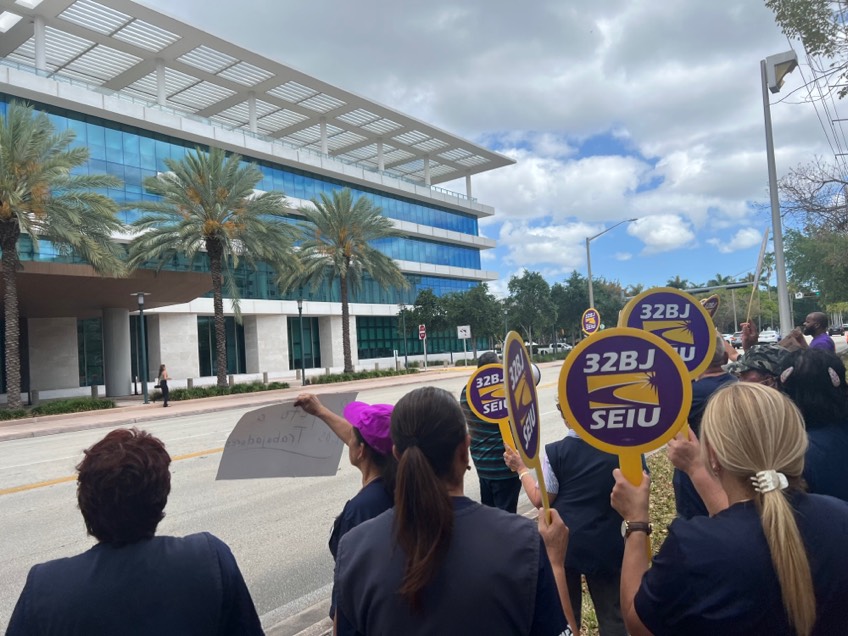

In the latest demonstration in a series of protests against ABM Industries, representatives of the Service Employees International Union (SEIU 32 BJ), upset janitorial staff and UMESA members took to South Dixie Highway on April 12 to demand job vacancies be filled.
“We are here to fight for our work to be fair and to stop overworking us,” protestor Olga Mendoza said. “It’s an allegation with all the respect to the company, but we deserve to be treated as human beings.”
Their anger can be attributed to the estimated 30 to 40 janitorial vacancies currently on campus that ABM refuses to fill that force the short-staffed janitors to compensate by upping their workload for no additional pay.
“When workers leave, they don’t fill the vacancies,” said Mars Fernandez, a graduate student studying counseling psychology. “So, what ends up happening is that the same amount of work needs to be done and managers pressure workers to do an extra amount of work.”
The University of Miami outsources the hiring of janitorial and groundskeeping staff to ABM Industries, a facility management company, paying them for the salary of the requested staff. Protesters said they believe that ABM is pocketing the wage money of the staff they are not hiring for their own benefit.
“I am sure that ABM has the money given by the university to hire workers but doesn’t use it for that,” Marlene Trejos, ABM janitor said.
The issue of understaffing was noticed amid the pandemic, when the janitorial staff was classified as “essential workers” because ABM and UM were desperate to have them clean their campus. Only limited staff were allowed to work because of distancing and isolation policies, but their expectations remained the same During the pandemic they blamed the extraneous amount of labor on COVID-19, but no adjustments have been made even as UM drops their COVID-19 regulations.
“I understand that during the pandemic there were no students, no open offices, but today’s reality it’s essentially back to normal,” Trejos said. “The students are back, the offices are open so it is not fair that they are saving their money while sacrificing us, the workers.”
Trejos has seen these issues unfold in front of her for the 33 years she has worked at UM. In all her time here Trejos said she has not seen an improvement in working conditions or pay, even as ABM claims to have made improvements.
“They’re doing a work surcharge, stating that our work hours are not eight hours when in reality we’ve been working eight hours for years under that same contract,” Trejos said. “It has always been eight hours.”
The organizers of the protest said that the problem runs deep, but the union lacks the bigger movement needed to pressure ABM to enact change out of a fear of losing job security.
“The people are bothered and upset but at the same time, we are scared. We’re scared because if we don’t accept the treatment that they are giving us, then they could potentially fire us,” Trejos said.
The unioners have attempted to redirect their efforts through UM, hoping that having the university behind their cause will compel ABM to oblige. However, the union has been unable to gain much traction here either as UM directs complaints back to ABM, effectively gridlocking the movement.
“The university always tells us that we are subcontracted and that we need to resolve these problems with ABM,” said Antonio Benton, a union delegate and ABM employee. “It’s frustrating and when it happens, we have to try to put pressure and that’s exactly why we are here united and are protesting.”
The shared sentiment of the protestors was that though ABM was to blame, the university should be taking bigger strides to pressure ABM and honor the work of the janitorial staff.
“The university talks a lot about a culture of belonging, of Canes Care for Canes, but through the practice of subcontracting out an essential piece of work on the university they are effectively disenfranchising a whole group of people who are the most exploited workers at the university,” Fernandez said. “We would like to see President Frenk not pretend like janitors and groundskeepers and cafeteria workers are not part of our university community.”
Many of the protestors said they are pushing for more student and faculty involvement in these protests to encourage the university to take a strong stance against ABM’s treatment of their workers.
“I think it’s important that we support our community, especially the people who take such great care of our school,” said Emily Bosworth, a first year Ph.D. student at UM studying counseling psychology. “It’s important for the students who benefit from these workers to be here supporting them.”
Bosworth, one of the only students present at the protest, is a member of UMESA, an organization that builds a bridge between the workers of the school and the students they are working for.
“I want to see more students and I want to see more faculty here,” Bosworth said.
Mars Fernandez’s interview was translated from Spanish to English by the City News Editor, Jess Diez.






